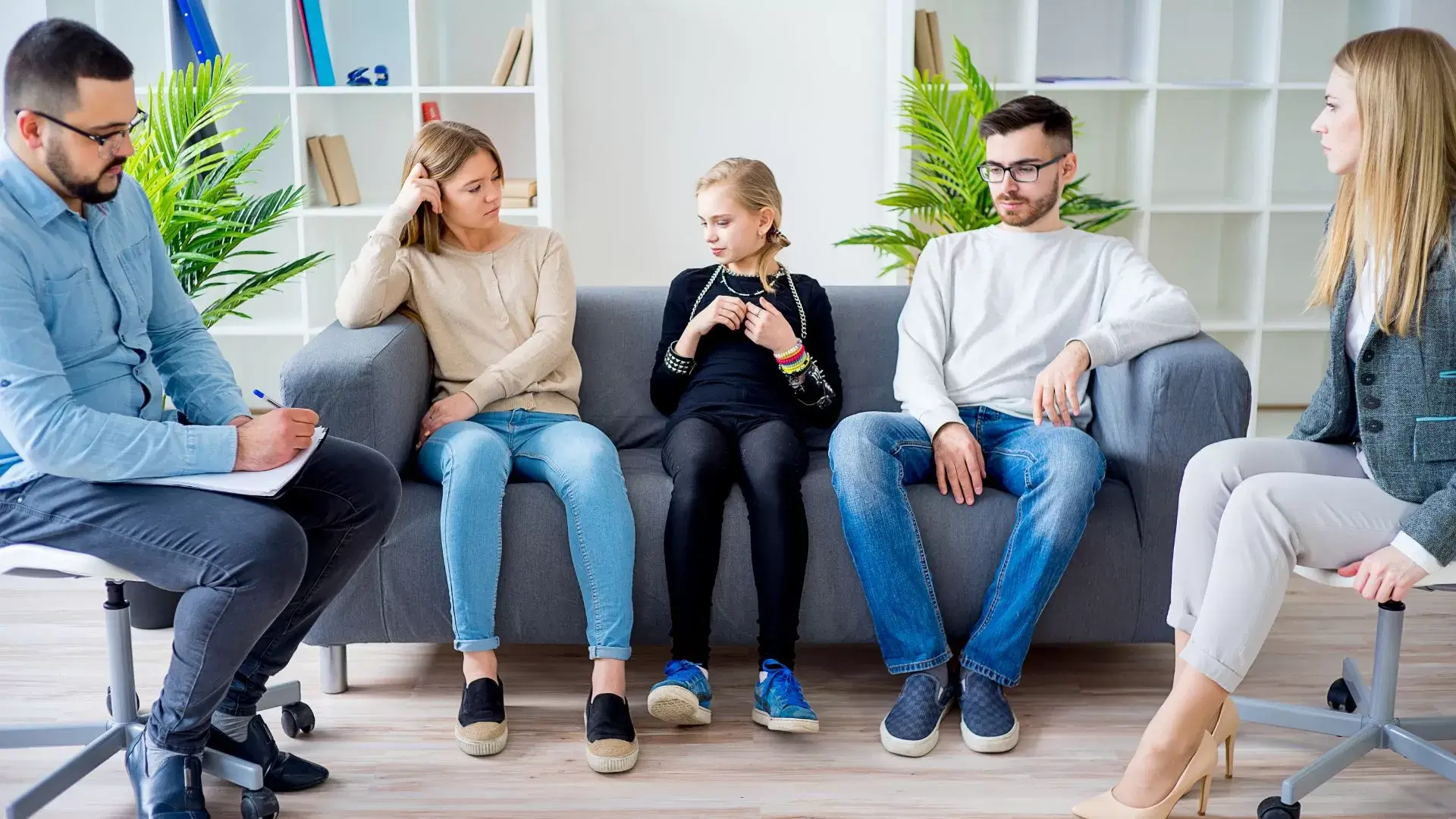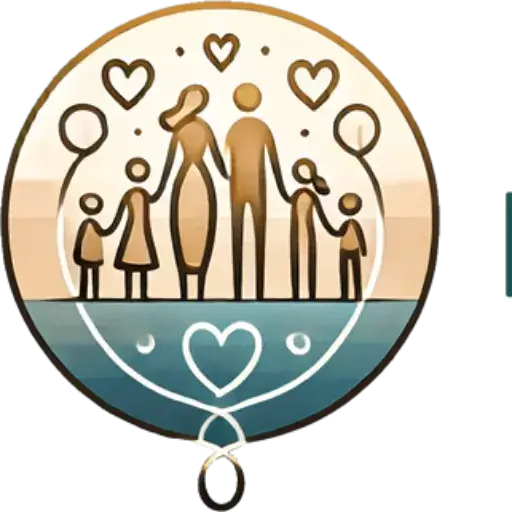Cognitive Behavioral Therapy Center for Sexual Behavior
We recognize that Family Counseling Therapy is essential for addressing sexualized behavior in children and adolescents. This supportive approach fosters open communication, helping families navigate complex emotions together. Our trained therapists create a safe space to explore underlying issues while reinforcing boundaries and healthy sexual development. By engaging in therapy, we can better manage anxiety and strengthen family ties, allowing for healing and resilience. It’s important to acknowledge that this journey can lead to profound improvements in family dynamics. If you’re interested in how these strategies can be tailored to your situation, there’s more helpful information waiting for you.

About Mississauga Family Counselling Therapy
Family counseling therapy is a collaborative approach that helps us navigate the complexities of our relationships and fosters stronger connections within our families. In this safe space, we can address sensitive issues like sexualized behavior, which may stem from experiences of sexual abuse or confusion about sexual boundaries. Through trauma-informed therapy, we gain insights into child sexual development and its implications for our loved ones.
Family counseling therapy provides a platform for open communication, allowing us to explore how we can support one another in our journeys. We can utilize various family therapy techniques to strengthen our understanding of each member’s needs and feelings. Additionally, incorporating sexual health education into our discussions can empower us to set appropriate boundaries and foster healthy attitudes towards sexuality.
Parent-child therapy plays an essential role here, as it encourages direct dialogue between parents and children, helping to build trust and understanding. By participating in family support programs, we can further enhance our coping strategies and resilience as a unit. Together, we can create an environment that nurtures emotional well-being and strengthens our family bonds, ensuring we’re equipped to face challenges related to sexualized behavior.
Understanding Sexualized Behavior in Children and Adolescents
Understanding sexualized behavior in children and adolescents is essential for us as caregivers, as it can often reflect their attempts to navigate complex emotions and experiences. We recognize that sexual curiosity is a natural part of sexual development, but it’s vital to differentiate between healthy child sexual behavior and potential sexual behavior problems.
When we observe sexualized play or behaviors, we should approach these situations with empathy and an open mind. Conducting a thorough sexual behavior assessment can help us identify if these behaviors are age-appropriate or indicative of deeper issues, such as exposure to inappropriate content or experiences. We must also reinforce the concept of sexual consent and establish clear sexual boundaries in therapy, ensuring that our children understand what is acceptable.
Moreover, we have a responsibility to engage in sexual abuse prevention, educating our children about their bodies and their rights. By fostering open communication, we can create a safe environment where they feel comfortable discussing their feelings and curiosities. Ultimately, our understanding of sexualized behavior enables us to support healthy emotional growth and guide children toward a positive understanding of their sexuality.

The Role of Family Therapy in Managing Sexualized Behavior
In traversing sexualized behavior, engaging in family therapy can provide an essential support system that fosters open dialogue and understanding among all family members. A skilled family therapist helps us navigate the complexities of sexualized behavior, guiding our family therapy sessions with a focus on healing and growth. Through therapeutic interventions, we can explore the underlying issues contributing to these behaviors while guaranteeing emotional support in families.
Family dynamics often become strained when addressing sexual behavior therapy, but with the right approach, we can promote conflict resolution in families. Our therapist can facilitate discussions that encourage honesty and empathy, allowing us to share our feelings and experiences in a safe environment. This trauma-informed care guarantees that we’re all aware of the potential impacts of past experiences, particularly in cases of sexual abuse recovery.
Cognitive-Behavioral Therapy (CBT) for Families Dealing with Sexualized Behavior
Cognitive-Behavioral Therapy (CBT) can offer us valuable tools to address the complexities of sexualized behavior within our family dynamics. By working with a cognitive-behavioral therapist, we can gain insights into the underlying thoughts and feelings contributing to our child’s sexualized behavior. CBT focuses on understanding these behaviors, allowing us to implement effective sexual behavior interventions tailored to our family’s needs.
As we navigate the family therapy process, we might explore the impact of stress management techniques and the importance of emotional resilience. An emotional resilience specialist can guide us in developing coping strategies that enhance our family’s overall well-being. Additionally, when faced with issues like sexual trauma or exploitation, CBT can be integrated with sexual trauma counseling to support our child’s recovery.
Utilizing family guidance services, we can foster open communication and build a stronger family unit. This collaborative approach not only empowers us to address child sexualized behavior but also helps in establishing a healthier environment for recovery and growth. Ultimately, CBT equips us with the tools necessary to promote healing and understanding, ensuring our family can move forward together.
Parent-Child Therapy for Healing and Emotional Support
Building on the insights gained from CBT, parent-child therapy offers a compassionate space where we can foster healing and emotional support for both ourselves and our children. This therapeutic approach is essential, especially when addressing sexualized behavior that may stem from experiences of sexual trauma or abuse. By engaging in parent-child therapy, we can create a nurturing environment that promotes understanding and connection.
Through family counseling services, we learn to communicate openly about feelings and experiences, providing emotional support that aids in child sexual abuse recovery. This holistic therapy approach allows us to recognize the impacts of sexual abuse while emphasizing the importance of emotional well-being.
Therapeutic counselling equips us with the tools to navigate these sensitive discussions, ensuring our children feel safe and supported. We can also explore sexual behavior therapy for children, which helps address and reshape inappropriate behaviors through effective strategies.
Ultimately, parent-child therapy not only facilitates healing but strengthens family bonds. As we journey through this process together, we can cultivate resilience and foster a sense of safety, reinforcing our commitment to each other’s emotional health and well-being.
Trauma-Informed Family Therapy for Sexual Abuse Survivors
Trauma-informed family therapy often provides a safe haven for survivors of sexual abuse, allowing us to address the complex emotions and experiences that can arise within the family dynamic. As we navigate the path of child sexual abuse recovery, we recognize that understanding sexualized behavior is essential for healing. Our family counselling services focus on fostering an environment where each member feels supported and heard.
Through trauma therapy, we explore the impact of sexual victimization on the entire family unit, providing tools for emotional resilience. We emphasize the importance of grief counselling to help families process their loss and pain, guiding them toward healthier emotional well-being. Parental guidance becomes a key component, equipping caregivers with strategies to support their children while managing their own feelings.
In moments of crisis, crisis intervention therapy can step in to address immediate concerns, ensuring that no one feels isolated in their struggle. Together, we work to create a nurturing space where survivors can reclaim their narrative and families can restore their bonds. By prioritizing trauma-informed practices, we can greatly enhance family emotional well-being and pave the way for lasting recovery.

Supporting Family Members Affected by Sexual Misconduct and Boundaries Issues
Supporting family members affected by sexual misconduct requires us to create open lines of communication and establish clear boundaries to foster healing and understanding. In family therapy, we can address the emotional turmoil that often accompanies sexual boundary issues. It’s vital that we engage in emotional therapy to help each member process their feelings without judgment.
We also need to recognize how sexual behavior in children can manifest and guarantee that we provide appropriate sexual education to prevent future occurrences. Parental counseling can be a significant component, guiding us on how to approach sensitive topics with our children and guaranteeing we reinforce healthy boundaries.
As we navigate this challenging terrain, employing effective family conflict management strategies can help us support one another. By working together in therapy for family issues, we can create a safe space for open dialogue, allowing each family member to express their feelings and experiences. This collaborative effort not only strengthens our bonds but also promotes resilience against the impact of sexualized behavior. Ultimately, our goal is to foster an environment of trust and healing, paving the way for a healthier family dynamic moving forward.
Conflict Resolution and Communication Skills in Families
Steering through sensitive topics like sexual misconduct can often lead to conflicts within families, making it essential for us to develop strong communication skills and effective conflict resolution strategies. By engaging in family communication therapy, we can create a safe space for discussing difficult issues, like sexualized behavior and exposure to sexualized content.
When we focus on enhancing our communication skills through therapy, we’re better equipped to navigate the complex relationship dynamics that arise. Utilizing parenting strategies that promote open dialogue helps foster an environment where our children feel safe expressing their feelings and concerns.
Conflict resolution is not just about finding solutions; it’s about understanding each other’s perspectives. Through family-focused therapy, we can address underlying issues that may contribute to conflicts, ultimately improving adolescent mental health.
Incorporating family behavioral therapy techniques allows us to establish healthy patterns of interaction, reinforcing our commitment to support one another. By prioritizing communication and conflict resolution, we can strengthen our family bonds and create a nurturing environment that helps everyone thrive. Together, we can face these challenges and emerge stronger as a family.
Holistic Family Therapy Approaches for Sexualized Behavior
Maneuvering the complexities of sexualized behavior within families requires a holistic therapy approach that addresses emotional, psychological, and relational aspects in a compassionate manner. In our practice, we emphasize holistic family therapy to create an inclusive environment where every family member feels heard and supported. This approach integrates behavioral therapy techniques, focusing on understanding the roots of sexual risk behavior and fostering sexual self-regulation.
Through family-centered counseling, we can guide families in steering through the aftermath of child sexual abuse recovery, ensuring that healing is a shared journey. Couples and family therapy sessions allow us to address how sexual integrity impacts relationships, helping partners rebuild trust and communication. Additionally, we provide parenting coaching to empower caregivers with strategies that promote healthy sexual development and boundaries.
Parental Guidance and Strategies for Managing Sexualized Behavior
When it comes to managing sexualized behavior in children, we recognize the significance of providing parents with clear guidance and effective strategies that foster healthy communication and understanding. Prioritizing family wellness, we can help parents navigate the complexities that arise from sexualized behavior, ensuring they feel supported and empowered.
One essential aspect of parental guidance is establishing clear sexual boundaries. We encourage open discussions about body autonomy and respect, addressing topics like sexual exploitation and harassment. By incorporating age-appropriate sexual education, we equip children with the knowledge they need to understand their feelings and behaviors.
Additionally, sexual health counseling can be beneficial for families facing challenges related to sexual reactivity. This creates a safe space for parents to explore their concerns, promoting child sexual abuse recovery and resilience. It’s important for parents to model healthy behaviors, demonstrating how to navigate relationships and emotions effectively.
Group Therapy for Families Impacted by Sexualized Behavior
Group therapy can offer families a supportive environment to address the challenges and emotional complexities that arise from sexualized behavior, fostering connection and understanding among those who share similar experiences. In our sessions, we explore the impact of sexual aggression and the sexual exploitation of children, helping families process their emotions and build resilience.
We recognize that sexual behavior in adolescents can be deeply distressing for parents and siblings alike, and group therapy allows us to discuss these experiences openly. By sharing our stories, we promote family mental health and create a safe space for healing.
Through couples and family therapy, we can identify patterns and develop strategies to support each other. This collaboration helps enhance mental health awareness within the family unit, ensuring that everyone feels heard and valued.
As we navigate child sexual abuse recovery together, we learn from each other’s journeys, which can be empowering. In this collective environment, we not only address the immediate challenges of sexualized behavior but also strengthen our bonds, ultimately fostering a healthier family dynamic. Together, we can move forward, equipped with insights and strategies to support one another.

Siblings and the Impact of Sexualized Behavior: Family Counseling Solutions
Understanding the profound impact of sexualized behavior on siblings is essential for fostering healing and connection within the family unit. When one sibling exhibits sexualized behavior, it can create confusion, fear, and anxiety among their brothers and sisters. We need to address these feelings through siblings therapy, which focuses on restoring trust and communication.
Child-on-child sexual abuse can deeply affect siblings, blur sexual boundaries, and impact their understanding of healthy relationships. It’s crucial that we guide them in recognizing inappropriate sexualized language and behavior, as this can help them establish their own sexual boundaries. Engaging in family mental health care allows us to create a safe space for discussing sexual behavior in youth and the associated feelings that arise.
Through child sexual abuse recovery, we can encourage siblings to express their feelings and understand sexual impulses in a healthy way. By emphasizing family relationship building, we can strengthen bonds and foster a supportive environment. Together, we can navigate these challenges, helping each sibling heal and grow while promoting understanding and love within the family.
Managing Anxiety and Depression in Families Dealing with Sexualized Behavior
Steering through the complexities of anxiety and depression in families affected by sexualized behavior requires compassion, open communication, and a commitment to healing together. We often find ourselves maneuvering the turbulent waters of anxiety in families and depression in families, which can arise when dealing with such sensitive issues. Seeking support from a licensed counsellor at 123 ABC Road, Oakville, Ontario, can be an important step toward understanding and addressing these emotions.
Family health counselling provides a safe space for us to express our feelings and challenges. We can explore how sexualized behavior has impacted our family dynamics and discuss effective strategies for sexual boundary setting. By engaging in open dialogue, we foster an environment where each family member feels heard and valued.
Furthermore, support for parents dealing with child sexual abuse recovery is vital. By participating in group sessions or workshops, we can share our experiences and learn coping mechanisms that promote resilience. Together, we can create a strong foundation for healing, ultimately transforming our family relationships and fostering a brighter future.
Family Therapy for Sexual Trauma Recovery
Steering the aftermath of sexualized behavior often leads families to seek specialized support, and family therapy can play a crucial role in the recovery process for all involved. When we engage in therapy for stress related to childhood sexual trauma, we open pathways for understanding and healing. A family therapist with certification in trauma-informed care can guide us through the complexities of sexual violence and sexual exploitation, ensuring each family member feels heard and supported.
In our sessions, we can explore the impact of sexualized behavior on our relationships and individual well-being. Child therapy is particularly important for younger members, as it provides them a safe space to process their experiences without the fear of sexual re-traumatization. As we navigate these challenging conversations, we also address issues like sexual addiction that may arise in the aftermath.
Ultimately, family healing requires a collective effort. By working together, we can foster a nurturing environment where empathy thrives, helping us mend the emotional wounds inflicted by these experiences. Through this shared journey, we can rebuild trust and resilience, allowing us to emerge stronger as a family.
Contact Our Mississauga Family Counselling Therapy Center for Sexualized Behavior Support
If you’re maneuvering the complexities of sexualized behavior within your family, our Family Counseling Therapy Center is here to provide the compassionate support you need. We recognize that addressing issues like sexually inappropriate behavior, sexualized images, and sexual exploitation can feel overwhelming. That’s why our dedicated marriage and family therapists are ready to help you navigate these challenges.
In our center, we offer tailored couples therapy and family sessions focused on childhood sexual abuse recovery and the development of effective coping mechanisms. We believe that mental wellness is achievable, and we’re committed to guiding you through this journey with empathy and professionalism.
If you’re ready to take the next step, don’t hesitate to reach out. You can contact us at 111-111-1111 to schedule an appointment. Together, we can create a safe and supportive environment where your family can heal and grow. Remember, you’re not alone in this; we’re here to help you reclaim your family’s well-being and foster healthier relationships. Let’s work together to find the strategies that will restore balance and peace to your lives.

Frequently Asked Questions
What Qualifications Should I Look for in a Family Therapist?
When we’re seeking a family therapist, we should look for qualifications that guarantee they’re well-equipped to help us. It’s important to check for relevant credentials, like a master’s degree in psychology or social work, and licenses specific to our needs. We’d also want someone with experience in family dynamics and effective communication. A strong rapport and an empathetic approach can make a significant difference in our journey toward healing and understanding.
How Long Does Family Counseling for Sexualized Behavior Typically Last?
When it comes to family counseling, the duration can really vary based on individual needs and circumstances. Typically, we might expect sessions to last anywhere from a few weeks to several months. It’s important to remember that everyone’s journey is unique, and our therapist will work with us to determine the best pace. We’re here to support each other, and the focus will always be on fostering understanding and healing within our family.
Are Sessions Confidential, and Who Else Can Attend?
When it comes to counseling sessions, we comprehend that confidentiality is essential for building trust. Generally, sessions are confidential, meaning what’s discussed stays between us, unless there’s a risk of harm or legal obligation. As for who can attend, typically, it’s just the family members involved, but we can discuss any additional support persons you’d like to include. We’re here to create a safe space for everyone’s feelings and needs.
What Can I Expect During the First Therapy Session?
During our first therapy session, we can expect a warm and welcoming environment where we’ll discuss our goals and concerns. The therapist will likely ask us questions to understand our situation better, helping to build trust. It’s normal to feel a bit nervous, but remember, we’re in this together. We’ll have a chance to share our thoughts and feelings, and the therapist will guide us through the process with empathy and support.
How Much Does Family Counseling Therapy Typically Cost?
When we consider the cost of family counseling therapy, it can vary considerably based on factors like location, therapist experience, and session frequency. Typically, we might see prices ranging from $200 to $400 per session. It’s important for us to remember that some therapists offer sliding scale fees based on income, making it more accessible. We should explore our options and discuss any financial concerns with the therapist to find a suitable arrangement.

